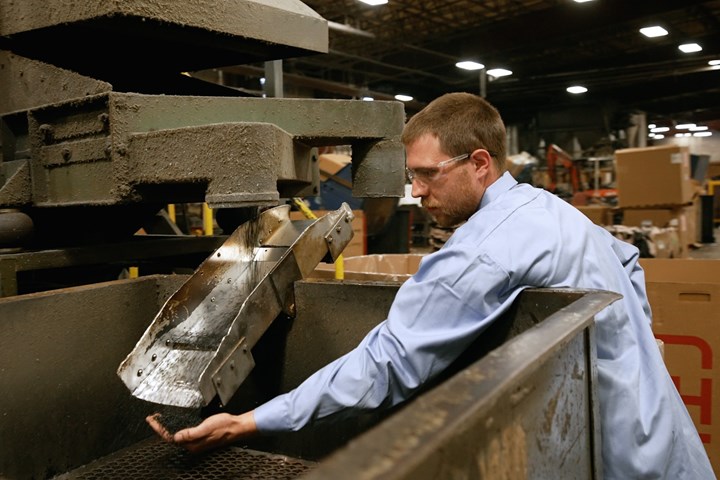Advocacy Campaign Promotes Plastic Recycling and Recyclers
Policymakers targeted with a message of recycling feasibility.
The Plastics Industry Association (PLASTICS) announced an advocacy campaign titled “Recycling is Real,” dedicated to promoting and defending plastic recycling. The $1 million campaign will provide content aimed at elected officials and policymakers, to inform their decisions on behalf of constituents.
The campaign will be primarily digital advertising, including thousands of emails and a website. A series of videos on the website will present the manufacturing process of recycling, featuring the recyclers, converters and equipment suppliers who reprocess plastics.

Plastic being reprocessed at Ultra-Poly, a recycler based in Pennsylvania. Photo Credit: PLASTICS Industry Association.
Matt Seaholm, the association’s president and CEO, said that the intent was to give voice to the people who make recycling happen. “When you see it, it’s a lot harder to accept the idea that recycling is not happening,” Seaholm says. The videos feature footage of recycling processes, along with recycling workers speaking about what they do. Videos featuring Ultra-Poly, Novolex, Placon and MAAG have been released, with additional videos to follow in the coming weeks and months.
Through promoting recycling, the campaign aims to forestall any legislative measures aimed at controlling plastic waste through source reduction. The EPA last estimated the U.S. recycling rate for plastics at 8.7%, for 2018. The agency has yet to update that figure, but reports from the Association for Plastic Recyclers show the amount of plastic recycled in 2021 was roughly the same as 2019.
According to Seaholm (read more of his commentary on the campaign), the industry acknowledges that the plastic recycling rate needs to increase, and is committed to finding solutions that keep plastics out of the environment. Solutions with potential to bolster the recycling industry include extended producer responsibility (EPR) tools, which can help fund necessary infrastructure; and recycled content requirements, which can help stabilize prices by creating a steady end market, which enables investments.
“The industry needs partners, because we do not control the whole process,” Seaholm says. “We need people around the table who understand that recycling can work.”
Related Content
-
SD Polymers: 'One-Stop Solution for Mechanical Recycling'
‘Passionate’ recycler invests in people and technology to meet commitment to innovative, sustainable solutions for its processor customers.
-
Advanced Recycling: Beyond Pyrolysis
Consumer-product brand owners increasingly see advanced chemical recycling as a necessary complement to mechanical recycling if they are to meet ambitious goals for a circular economy in the next decade. Dozens of technology providers are developing new technologies to overcome the limitations of existing pyrolysis methods and to commercialize various alternative approaches to chemical recycling of plastics.
-
Purpose-Built System Enhances Capacity and Flexibility for Recycler
A Boston recycler invested in a turnkey shredding, granulation and elutriation system to expand its plastics reclaim business.















